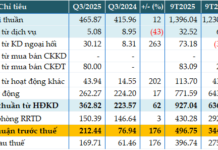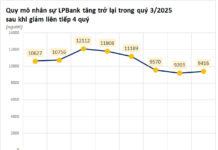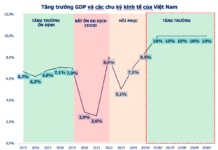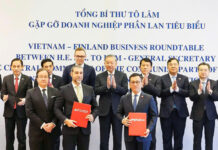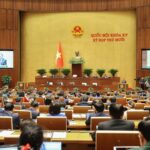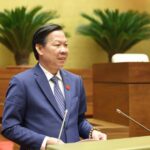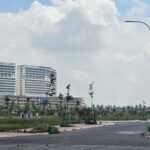On October 20th, during the 10th session, Deputy Prime Minister Nguyen Hoa Binh presented the Government’s comprehensive report summarizing its achievements during the 2021-2026 term to the National Assembly.
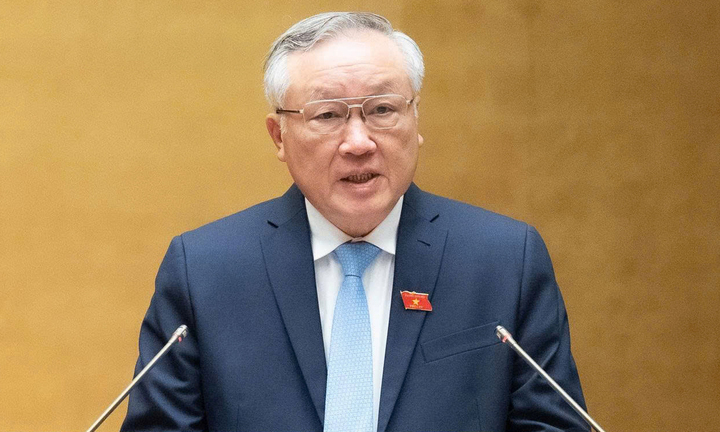
Deputy Prime Minister Nguyen Hoa Binh.
The Deputy Prime Minister highlighted that during this term, the Government and the Prime Minister have rigorously implemented 116 action programs and plans to effectively enforce the Constitution, laws, resolutions, and directives from the Party, National Assembly, and its Standing Committee.
“Between 2021 and 2025, the Prime Minister and Deputy Prime Ministers conducted over 400 working trips to local areas and grassroots levels to inspect and guide the implementation of the Constitution and laws, ensuring a firm grasp of practical situations and promptly addressing challenges and bottlenecks.”
“Strict discipline and legal compliance have been enforced in organizing and implementing laws. Laws, ordinances, and resolutions are promptly executed upon issuance, emphasizing the accountability of leaders and ensuring adequate resources for implementation,” stated Deputy Prime Minister Nguyen Hoa Binh.
Regarding policy and legal development, the Government and Prime Minister have shifted from a “management” to a “development facilitation” approach, transitioning from “ex-ante” to “ex-post” checks. They have proactively proposed numerous laws with flexible, facilitative mechanisms, contributing to the perfection of the socialist rule of law state and the socialist-oriented market economy, while promptly removing institutional bottlenecks.
According to the Deputy Prime Minister, the Government has organized 45 specialized law-making sessions, submitted to the National Assembly for adoption a Resolution on special mechanisms and policies to create breakthroughs in law-making and enforcement, and passed 180 laws, ordinances, and resolutions (including this session), the highest number ever. Additionally, 1,400 resolutions and 820 decrees have been issued.
Emphasizing macroeconomic stability and high growth promotion, the Deputy Prime Minister noted that the Government has proactively and flexibly managed monetary policy, achieving timely and effective results.
Despite facing an unstable global context, pandemics, and natural disasters, the economy has maintained high growth, increasing its scale from $346 billion (37th globally) to $510 billion (32nd globally). Per capita income has risen from $3,552 to approximately $5,000, elevating Vietnam to the upper-middle-income group.
Alongside effective COVID-19 control, the Government has ensured social welfare and improved the people’s living standards, with strategic infrastructure witnessing breakthrough developments.
According to the Deputy Prime Minister, strategic infrastructure has seen significant breakthroughs, with the Government focusing on its synchronized completion for the economy. Notably, by the end of 2025, 3,245 km of expressways and 1,711 km of coastal roads are expected to be completed, surpassing set targets.
Key national projects in aviation and energy, such as Long Thanh Airport and the 500kV circuit 3, have accelerated progress. Digital infrastructure has developed robustly, placing Vietnam’s mobile internet speed among the global top 20.
Notably, according to the Deputy Prime Minister, many stalled projects and long-struggling enterprises have been addressed, unlocking resources for development.
“With a spirit of not avoiding challenges, the Government has focused on decisively handling weak credit institutions and prolonged loss-making projects that previous terms could not resolve,” said the Deputy Prime Minister.
The report indicates that the Government has directed the development and submission to the Politburo for opinion, and implemented solutions for 5 weak banks, 12 delayed projects and enterprises, and long-stalled projects (such as Song Hau 1 Thermal Power Plant, Thai Binh 2, Van Phong BOT, Nghi Son 2, O Mon Gas-fired Power Plant, and Block B gas field), with initial positive results.
Additionally, the Government has directed the removal of obstacles for thousands of projects and land facilities nationwide (excluding 136 real estate projects, 1,127 land facilities in Ho Chi Minh City, Da Nang, Khanh Hoa, and 142 renewable energy projects), and continues to resolutely address bottlenecks, swiftly bringing these critical resources back into service for socio-economic development.
Regarding the reorganization of ministries, agencies, and local governments within the state administrative system, the Deputy Prime Minister emphasized the resolute reorganization of the political system, streamlining the Government structure scientifically, concluding the historical mission of the district level, and organizing local governments into two levels: lean, strong, efficient, and effective.
Amid unprecedented challenges, the 2021-2026 Government has united, acted decisively, and excellently fulfilled its assigned tasks, leaving significant imprints.
These comprehensive achievements, according to Mr. Nguyen Hoa Binh, have solidified public trust, creating momentum for the nation’s rapid, sustainable development into a new era.
However, the Government and Prime Minister’s task implementation still faces limitations.
To contribute to realizing the two strategic goals (by 2030, becoming a developing country with modern industry and upper-middle income, and by 2045, a developed country with high income under socialist orientation), the Government and Prime Minister will continue addressing limitations, focusing on 12 key areas.
Deputy Prime Minister Truong Hoa Binh emphasized completing the reorganization and streamlining of local governments into two levels, enhancing administrative reforms, controlling and reducing administrative procedures, and improving online public service quality for citizens and businesses.
Alongside promoting high growth while maintaining macroeconomic stability and inflation control, the Deputy Prime Minister stressed the importance of developing synchronized, modern infrastructure, effectively exploiting new development spaces, and leveraging urban areas as regional growth drivers.
Government leaders also highlighted the need to develop culture, society, and ensure social welfare, continuously improving the people’s material and spiritual lives and health. Strengthening national defense, ensuring national security, maintaining social order and safety, and creating a peaceful, stable environment for national development are also priorities.
Particularly, the Government will persistently fight corruption, negativity, practice thrift, and combat waste, while enhancing citizen reception and complaint resolution.
Prime Minister: 600 Trillion VND Allocated for Mekong Delta Transportation Infrastructure During This Term
On the afternoon of October 19th, in Can Tho, Prime Minister Pham Minh Chinh chaired a conference on the implementation status of expressway projects in the Mekong Delta region.
Central Government Urged to Allocate $36 Million for Erosion Control in Dong Thap
During a meeting with Deputy Prime Minister Mai Văn Chính, the People’s Committee of Đồng Tháp Province requested the Government to consider and provide approximately 830 billion VND in support for urgent measures to address two critically severe landslide areas along the Tiền River, located in Thường Phước Commune and Cao Lãnh Ward.
Can Tho 2030: The Southwest Region’s Hub and the Quantum Leap of Core Real Estate
Can Tho is poised for a transformative leap, aiming to become a national growth hub by 2030. With simultaneous upgrades in infrastructure, economy, and urbanization, a golden opportunity emerges for the core urban real estate market—particularly in areas adjacent to the city’s new administrative center.
National Assembly’s Economic Committee Applauds Government’s Bold Policies and Visionary Leadership
The National Assembly’s Committee on Economics and Finance (KTTC) commends the Government’s bold, decisive policies, its proactive mindset, and agile, timely leadership. These efforts have yielded significant positive outcomes, with many targets surpassing expectations. This success lays a crucial foundation, bolstering confidence, stabilizing the macroeconomy, and creating favorable conditions for rapid, sustainable development in the upcoming period.







